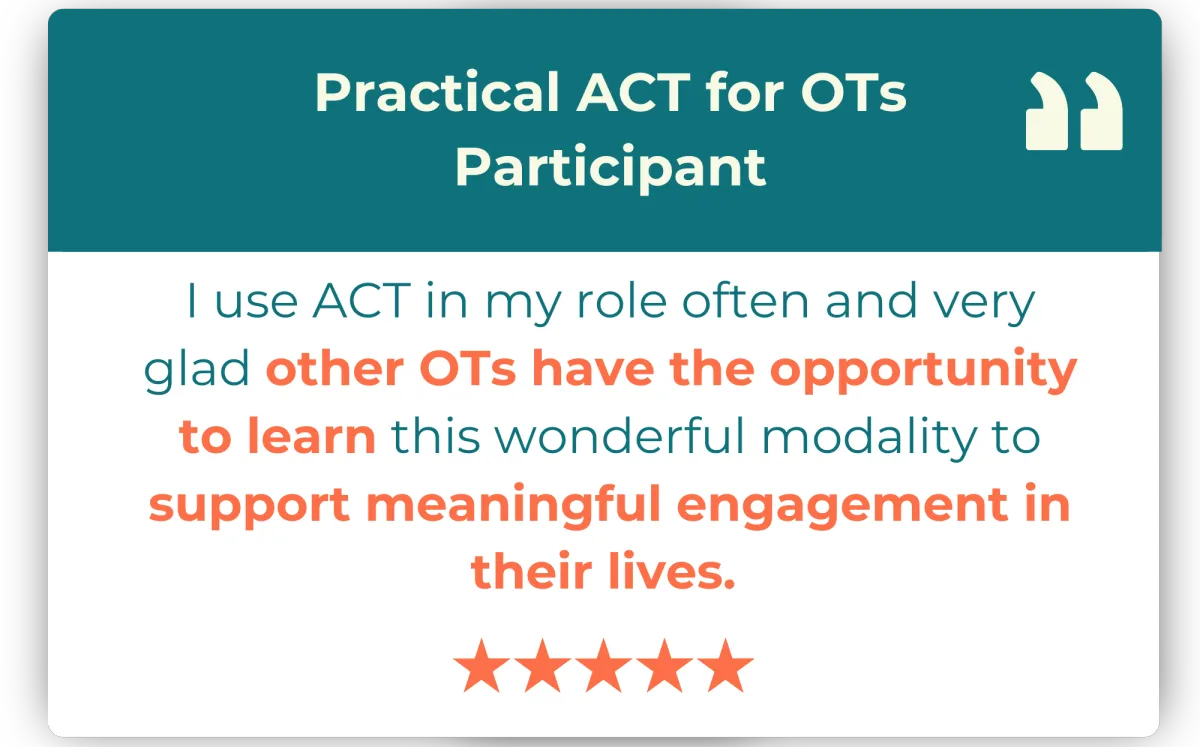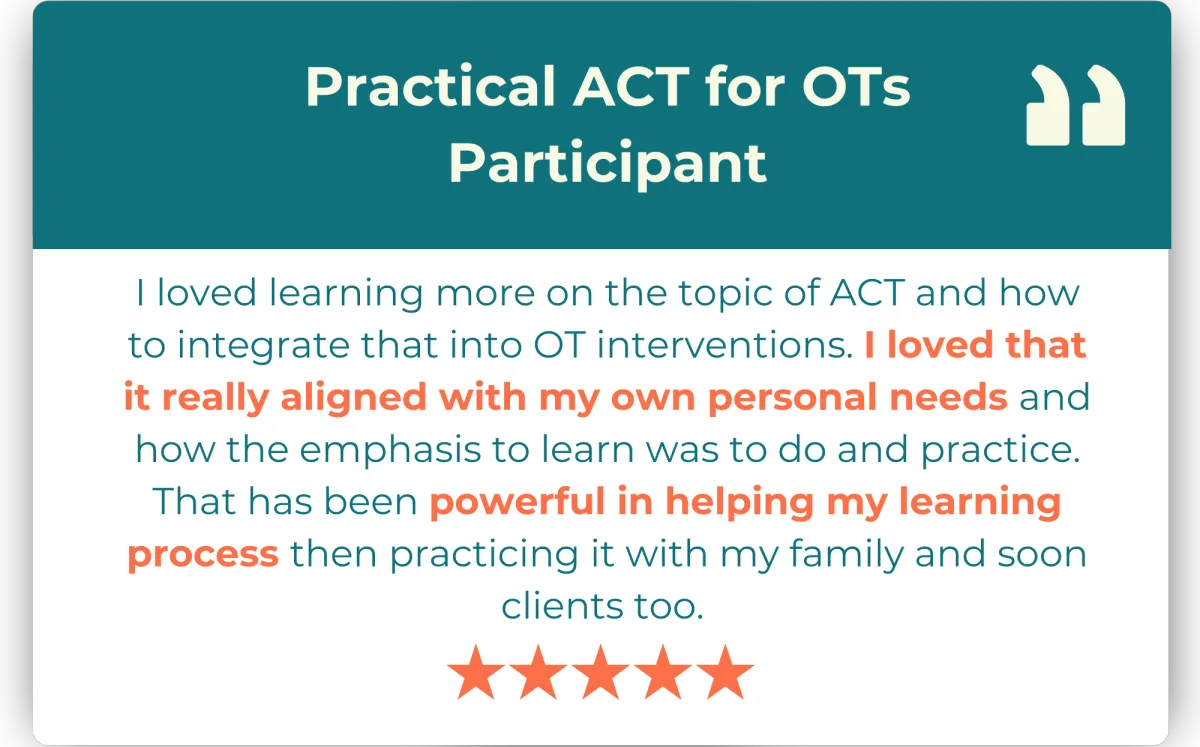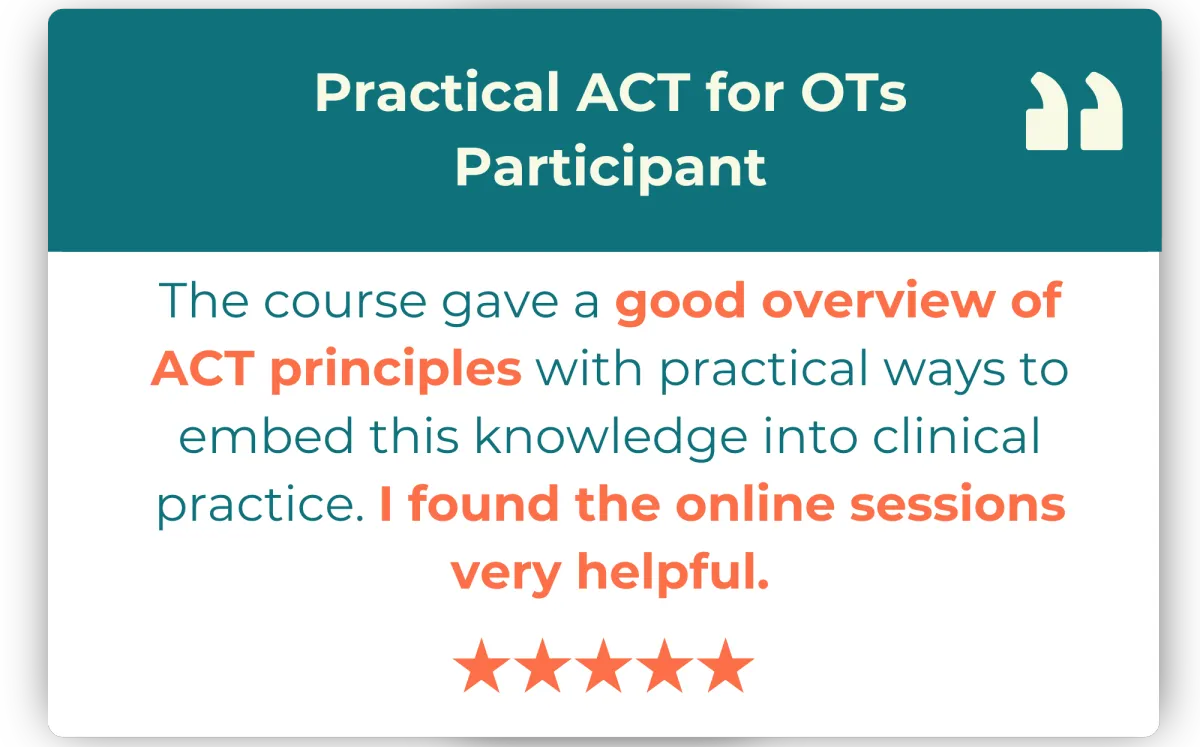Join the February 2026 Cohort Today
and get early access
Elevate Your Occupational Therapy Practice With ACT
Practical ACT for OTs
Learn to Apply These Psychosocial Skills in All Areas of OT Practice
"I've done ACT courses before and the occupational lens was always missing."
-2024 Participant
“This is one of the best courses I’ve taken online in 5 years.”
-2025 Participant
Let's bring Acceptance and Commitment Therapy to life in your practice through education that is:
Practical - More application than theory
OT-Congruent - As a modality in OT frameworks
Experiential - Apply ACT to your life first
Applied - Use ACT with your clients vs. teaching ACT to your clients
Why you need ACT in your OT Toolbox
ACT is a great tool for all areas of OT practice... NOT just mental health.
Do your clients struggle to follow through with therapy goals?
As OTs, we are good at identifying obstacles to engagement but WE often get stuck when our clients aren't moving forward due to painful inner experiences.
ACT helps us help our clients UNHOOK from difficult:
Thoughts
Feelings
Sensations
Memories
Images
SO that they can engage in what matters most to them.
ACT helps clients build a more flexible relationship to those inner experiences and refocuses on the DOING.
... and we love the doing don't we, OTPs?
My life changed personally and professionally 10 years ago when I learned ACT.
Initially, I was just excited to find a set of evidence-based tools that worked well in my mental health OT practice.
FLEXIBLE - COMPASSIONATE - OCCUPATIONAL
What I didn't know was that it would change how I show up in my personal life and how helpful it would be in other practice areas, beyond mental health.
Since Acceptance and Commitment Therapy is best learned experientially, get ready for a transformative personal experience.
Watch this video to hear how applying ACT can create more vitality in your life.
What is ACT or Acceptance and Commitment Therapy?
Here's my take on it as an OT:
ACT is an evidence-based approach to helping clients build a more flexibile relationship to the difficult thoughts, feelings, and sensations that tend to drive their actions so that they can do more of what matters. It uses mindfulness-based tools to facilitate more flexible engagement in meaningful occupations.
A formal definition from Dindo et al:
ACT, which begins with the fundamental understanding that pain, grief, loss, disappointment, illness, fear, and anxiety are inevitable features of human life. The goal of ACT is not elimination or suppression of these experiences. Rather, ACT emphasizes pursuit of valued life areas and directions, such as intimate relationships, meaningful work, and personal growth, in the face of these painful experiences. Increased engagement in meaningful life activities, even while experiencing negative thoughts and emotions or other difficulties, is accomplished in ACT by cultivating psychological flexibility.
Dindo L, Van Liew JR, Arch JJ. Acceptance and Commitment Therapy: A Transdiagnostic Behavioral Intervention for Mental Health and Medical Conditions. Neurotherapeutics. 2017 Jul;14(3):546-553. doi: 10.1007/s13311-017-0521-3. PMID: 28271287; PMCID: PMC5509623.
ACT gives us tools to help clients build psychological flexibility so that
they can fully participate in their lives in a values-aligned way.
Course Feedback from OTs



"It was exactly what I did not know I was after."
-New Zealand OT, 2025
"I just love Carlyn's delivery of complex material. Her pacing, tone of voice, reflections are top notch."
Not sure you can get it done this season?
LIFETIME ACCESS is the answer. Access to the optional live calls and the online community for learning support lasts for 4 months, but your access to the course videos and resource library don't end after four months. It's unlimited. Only the Skool community and live mentorship are limited to 4 months.
P.S. The videos can be watched in one morning if needed.
Here are the Details
8 Pre-recorded ACT educational videos made for OTs
Indefinite access to the videos
Certificate of completion
PDFs, worksheets & GIANT resource library, curated with OTs in mind
Online Skool community and resource sharing to for 4 months
Live optional Q & A support for 4 months
A single investment of $288 CAD (Click for Currency Conversion)
Ready to enhance your OT practice with ACT?
More Feedback from OT Participants
Confidence in ACT Application
"I have written about ACT on my blog...
I talk with clients about neurodivergent children often living with anxiety and OT won't remove the anxiety but can help them still do what they want to do even with it's presence."
Personal & Professional Value
"I've used it a lot personally!
I practice ACT principles almost daily and am working on applying these principles with the family.
We navigate chronic illnesses so this has been the perfect approach with managing those."
Clinical Impact
"ACT has helped give me a framework to engage with otherwise hard to reach clients...
I have also used more directly ACT material with patients, most notably using dropping anchor for patients who are experiencing high levels of anxiety."
"This has been the best delivery for any course I've ever taken."
An OT in Australia shared: What a Journey!
The training has made a real difference to my understanding of my clients’ needs and has boosted my confidence in incorporating ACT into my OT practice.
In particular, I now find myself more confident in supporting clients with low motivation and more effective at finding an opening for therapeutic engagement.
Thank you so much for designing such a thoughtful and practical program. I really appreciate that you have decided to make them available indefinitely. This gives me comfort knowing that I can always revisit these invaluable materials when I need to.
-Samuel
ACT will elevate your OT skills and enhance your personal growth.
FAQ
Will I be certified in the use of Acceptance and Commitment Therapy?
As stated by the Association for Contextual Behavioral Science (ACBS), "There is no ACT certification process. ACBS, as a community, has decided to forego this, as it could create a hierarchical and closed process which would be antithetical to our values. Rather, we aim to foster an open, self-critical, mutually-supportive community which, working together, builds a progressive psychology more adequate to the challenges of human suffering. There is no such thing as an officially certified ACT therapist."
Is this course mainly for mental health OTs?
No. Psychosocial barriers show up everywhere. This course is for OTs in any setting.
Learn to apply ACT as another tool in your belt to build flexible, intentional action when clients are limited by their thoughts and emotions. This might look like an individual who isn't following through with occupational goals until symptoms resolve or someone who is afraid to try a new approach or even when you need a bit more support in shifting your perspective in your client work.
How will live mentorship be delivered?
I have twice monthly optional Q & A drop-in Zoom calls. One call will be more suitable for North American and Australian timezones and the other will be more suitable for North American, European and Eastern timezones. These can be found in the Skool Calendar.
There is no curriculum for these calls. They are unstructured and customized to the needs of the live attendees. Recordings are not shared due to the sensitive nature of the info that is often shared by participants. Bring your questions, share reflections, and use this time to talk through your thinking or next steps with a particular client or your learning goals.
Don't wait until you've reached a certain point in the course to join a call. Come and be inspired to jump into learning from the very beginning. Carlyn is happy to show you around the resources and course components to make it feel more manageable.
How much prior ACT training or experience is needed to benefit from this course?
None. Whether you are new to ACT or have taken an ACT course but haven't started using it, this course will give you the skills and confidence to put ACT into practice in your OT work.
This course is meant to give you the basics of ACT and focus more heavily on HOW to use ACT in your OT practice. This course doesn't replace a comprehensive ACT training course or text book but it will help you start to apply ACT right away.
Do you offer CEUs?
You will automatically be sent a certificate of completion when you complete the modules. The learners who register create a rich international community that makes it impossible to seek CEU certification with the many regulatory organizations represented.
Your instructor, Carlyn Neek, is a Canadian OT who values lifelong learning and comes from a professional culture of continuing competence where the OT is responsible for their own continuing competence and professional development, including self-evaluation through reflective practice, determination of one's own learning needs, and independence in choosing ongoing professional enhancement opportunities through learning in a variety of ways. This naturally differs from regulatory environments where CEUs are central in continuing competence programs.
What is the time commitment? How many educational hours are included?
Finish in one morning or go slowly and reflect.
There recorded modules contain approximately 4.5 hours of video and no required reading. You really can finish in one day if you'd like.
Some people enjoy a casual listen through the videos like a podcast to get a sense of the content, tone, language, and layout then they feel more drawn to sitting down and taking some notes, exploring the resources and drawing connections.
Optional Learning Enhancement Time: Limitless
The live Q & A calls are optional. Come once or twice a month for one hour or not at all.
Each learner's time investment in the Skool online community discussions will vary. In the past, the online community has stimulated rich asynchronous discussion, reflection, sharing, and sharing of resources that complement the course.
The resource library contains several resources the instructor has created but also contains links to other extensive collections of ACT resources. In combination, there are endless opportunities for ongoing learning. Ideally, this course will set you on a path of lifelong ACT learning. 🤓
Remember: Your access to the videos and ACT Resource Library have no time limit. Only the online community and Q & A calls are limited to 4 months, 6 with the Black Friday
More questions?
Email Carlyn at cneek@balanceworksot.ca.

Balance Works Occupational Therapy Consulting Ltd.
Copyright ©2022 | All Rights Reserved